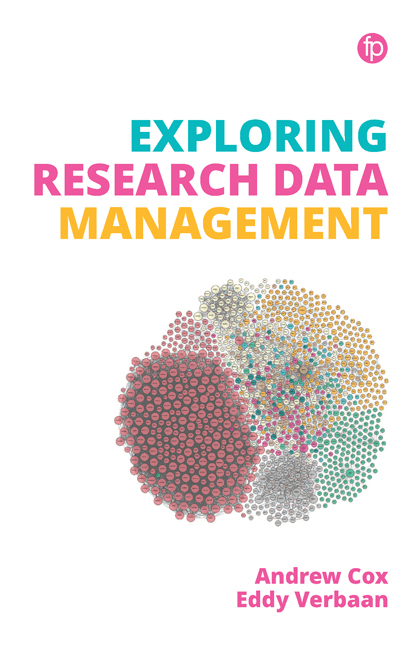Book contents
- Frontmatter
- Contents
- List of tables and figures
- 1 Introducing Research Data Management
- 2 The Social Worlds of Research
- 3 What Are Research Data?
- 4 Case Study of RDM in an Environmental Engineering Science Project
- 5 RDM: Drivers and Barriers
- 6 RDM as a Wicked Challenge
- 7 Research Data Services
- 8 Staffing a Research Data Service
- 9 Requirements Gathering for a Research Data Service
- 10 Institutional Policy and the Business Case for Research Data Services
- 11 Support and Advice for RDM
- 12 Practical Data Management
- 13 Data Management Planning
- 14 Advocacy for Data Management and Sharing
- 15 Training Researchers and Data Literacy
- 16 Infrastructure for Research Data Storage and Preservation
- 17 Evaluation of RDS
- 18 Ethics and Research Data Services
- 19 A Day in the Life Working in an RDS
- 20 Conclusion: the Skills and Mindset to Succeed in RDM
- Index
7 - Research Data Services
Published online by Cambridge University Press: 21 September 2019
- Frontmatter
- Contents
- List of tables and figures
- 1 Introducing Research Data Management
- 2 The Social Worlds of Research
- 3 What Are Research Data?
- 4 Case Study of RDM in an Environmental Engineering Science Project
- 5 RDM: Drivers and Barriers
- 6 RDM as a Wicked Challenge
- 7 Research Data Services
- 8 Staffing a Research Data Service
- 9 Requirements Gathering for a Research Data Service
- 10 Institutional Policy and the Business Case for Research Data Services
- 11 Support and Advice for RDM
- 12 Practical Data Management
- 13 Data Management Planning
- 14 Advocacy for Data Management and Sharing
- 15 Training Researchers and Data Literacy
- 16 Infrastructure for Research Data Storage and Preservation
- 17 Evaluation of RDS
- 18 Ethics and Research Data Services
- 19 A Day in the Life Working in an RDS
- 20 Conclusion: the Skills and Mindset to Succeed in RDM
- Index
Summary
Aims
The aim of this chapter is to explore the potential elements of a research data service(s) (RDS). It also sets this in a wider context of shifts in how research is supported as a whole in HE institutions.
Research data services (RDS)
Looking across the HE sector there seems to be a pattern towards developing services in areas where researchers need particular guidance and support. Following this trend, a central RDS may be created to take some of the burden of effort off researchers, apply special expertise and benefit from the economies to be gained of performing roles centrally. Such services can be understood as consisting of the following five components:
1 institutional policy
2 developing a clear and agreed mission
3 support, advice and training
4 infrastructure
5 evaluation strategy.
First, the task of defining an institutional policy on research data, backed by a business case, is likely to define the context within which the RDS can be built. A second component of an RDS is about developing a clear and agreed mission. A central aspect of this could be user requirements gathering at an initial stage. Specific services that can be developed are usefully grouped under the support, advice and training component and, as another component, infrastructure.
Support, advice and training
• Advocacy work – increasing understanding amongst the academic community and university leadership of the complex issues around RDM. This includes promoting awareness of policy. This is an important enough aspect of advocacy to be given special emphasis.
• Advice – from tailored one-to-one support through to generic FAQs and web pages. Supporting data management planning (DMP) is one specific aspect of an advisory service, but is important enough to often be seen as a service in itself. Hence in this book there is a chapter on data management planning.
• Training – this could be anything from one-to-one training to workshops, short courses, webinars and online tutorials.
Infrastructure
• Managing active data – this includes data storage, back-ups and data security.
• Appraisal and description of data for deposit, including data cataloguing. The catalogue may or may not be linked to a repository with access to data. It might be simply a listing of contact details and descriptions of datasets.
• Data sharing and long-term preservation.
- Type
- Chapter
- Information
- Exploring Research Data Management , pp. 67 - 74Publisher: FacetPrint publication year: 2018



